#than reading about 2 people bonking in the same fucking formulaic way
Text
you at the beginning of your author journey: I’m going to dispel the myth that you can’t make money writing! I’m going to write for a living, damnit! If EL James can do it then I can too!! How hard can it be to just write smutbooks right?! Let’s GO
you 2 years down the line, curled up in the grass: I just want to read books that were written with love, man. with real genuine love and curiosity and whimsy, and no actual regard for money or accessibility or “genre beats” or whatever nonsense rules they talk about in “7 figure fiction: How to use Universal Fantasy to SELL your book to ANYONE!”. I’ll scrounge in a camper van if I have to I don’t care, i just want to feel the love again
#writer life#writer problems#it fucks with your brain man#i'm reading moby dick and clan of the cave bear right now and both authors are just nerding out so much in their weirdly structured books li#*like#LOOK AT THIS STUFF ABOUT WHALES!! ISNT IT COOL#and also LOOK AT THIS STUFF ABOUT CAVEPEOPLE!!!#love just radiates everywhere it's great#i feel more love pouring from these books than all the formulaic romance books i've read#human beings allowing you to see them going on tangents about what they love = way more humanising and touching#than reading about 2 people bonking in the same fucking formulaic way#if i never have to read or write sex again i'll actually be very happy#indie adventures#i need to grab beatrix potter and lemony snicket and all those childhood books actually#to heal my brain from the romance world lmao#people in my network going around being really loud and proud about 'reading bonking books' i'm like#what is there to be proud about or to 'defend'? It's already a billion dollar industry#and i'm tired#(beta reading this book that is just like... so thin and empty of anything but sex and all the other betas apparently love it)#(and i'm just like. there's nothing here though????????? there's just nothing?????? it's just bland mayonnaise pornography)
35 notes
·
View notes
Text
Mega Man should stop presenting its flaws as indispensable features

When I was fifteen, I learned to play the song Malagueña on the piano. It was a laborious project; the culmination of nine years of piano lessons under the tutelage of Mrs. Diane Miller, and the main event for her upcoming student showcase.
This arrangement of the piece was a seven-pager, and somewhere around page four was a problem phrase I kept playing wrong, a rapid two-handed run up the keyboard with tricky fingering. I got to a point where I could play flawlessly up to that phrase, only to flub the phrase every time. Each time I flubbed it, my teacher would stop me and send me back to page 2. “You have to perfect that phrase,” she would say, “so try it again, but first play the preceding two pages, so it’s no longer fresh in your mind by the time you get to it again.” Alas, this would result in more flubs, and after three flubs in a row she would send me back to the beginning of the entire piece. “You’re still not getting it,” she’d say. “So I think we should run through the stuff you’ve already mastered one more time.” I would glance at her, trying to read her intent, and she would stare back at me, bug-eyed and malevolent.
The above story is false,because Mrs. Miller was a kind, intelligent, and non-insane person. Like all people of that description, she understood that you don’t work out a problem area by indiscriminately repeating ALL PRACTICE. When you get one problem wrong on a math quiz, you don’t review the entire textbook. You don’t work on your free throws by drilling layups and then also free throws. You can’t learn to poach an egg by toasting English fucking muffins all day. To suggest otherwise is an act of hostility.

Mega Manhas always carried this hostility. The game dishes out its challenges in neat little screen-sized units, but penalizes your failures with gratuitous setbacks, often requiring you to replay entire stages from the beginning. This makes learning inordinately tedious. You have to retread every yard for every yard gained.
I guess this is a relic of the arcade age, when games were designed with the express intent of punishing players—unless they paid up. Indeed, most of Mega Man’s NES contemporaries inherited this same feature in the form of finite lives and scarce checkpoints, but it never made much sense on home consoles. You could argue that it prolonged the lifespan of each game, but that only held true for the masochists who continued to tolerate this torturous system rather than reallocate all that wasted time to more fruitful pursuits like, I dunno, learning to play piano or poach an egg.
I’ve always liked Mega Man, but it was already starting to feel like a tired concept as early as Mega Man IV. I was about eight years old by then, and starting to catch on that they were running out of boss motifs. Pharaoh Man felt like a red flag.
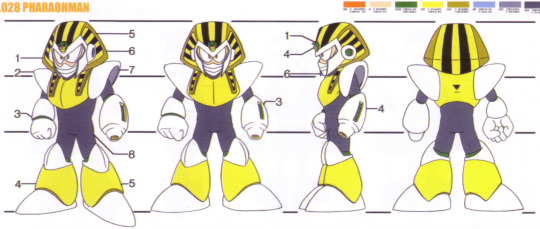
Mega Man has since proliferated into a multi-faceted franchise spanning more than 120 titles and three decades (and for the record, I’ve played through almost all of them), but it’s never really dispensed with its ancient baggage. Mega Man X brought new visual flare while diversifying the core action; Mega Man Zero imbued the series canon with new consequence and cool factor; Mega Man ZX fused the classic gameplay with the Metroidvania template; but all of these spin-offs continued to punish, punish, punish, to gatekeep their content from the series’ own consumers to no certain end.
When Capcom revealed Mega Man 9, I was momentarily taken with the nostalgia of it, but quickly lost interest when I realized that Capcom had no intent of evolving the series’ concepts, even in basic quality-of-life ways. Lives and weapon energy were still pointlessly commodified, checkpoints sadistically scarce. They’d even removed what few innovations the series had seen to date, such as the slide and the charge shot. Nor did the roster of Robot Masters appear any more inspired than the cast of rejects that had turned me off five installments prior. Capcom had had seventeen years to think about it and all they’d come up with were lame analogs of pastbosses, like Tornado Man and Magma Man. It’s like they thought they hadto retread the same shit beat for beat or people would get confused. Even their ace, Splash Woman, was just another in a long line of water-themed bosses.

Mega Man 10 as a follow-up was downright depressing. Strike Man, Pump Man, and Chill Man are what you get when you realize yesterday was the deadline and all you’ve got is a pen and a cocktail napkin. I can’t fathom that a bunch of game designers sat around brainstorming ideas for Mega Man fucking 10 and someone was like, “Hmm, what about an ice-themed boss.”
Now we have Mega Man 11, the long-awaited, belligerently-demanded revival of the MM franchise after some eight years of dormancy. After playing the demo, I find myself wondering why. Why are we here? Why is Mega Man 11 Capcom’s answer after saying no to Mega Man for eight years? It’s the SAME.
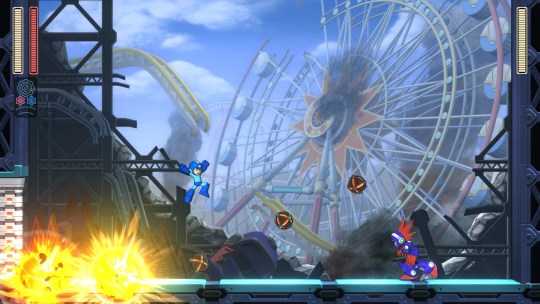
Yes, it looks and sounds nicer and there’re a couple new mechanics—which are themselves comically uninspired takes on the ancient tropes of bullet time* and Devil Trigger—but I’m mystified at how unchanged the formula still is after eight years of seemingly adamant dismissal of the entire franchise, let alone the thirty-one years they could’ve been critically examining it. Do they realize that other developers have been building on this genre since the eighties?
*Weird side note: The tutorial for Mega Man’s new “Speed Gear” ability explains that the gear makes you “move so fast that everything else seems slow,” but in practice Mega Man moves just as slowly as everything else. So it’s not Mega Man who’s moving fast, it’s. . . the player?

Punishment as “Difficulty”
In the Block Man (lol) stage of the demo, there’s a section where you have to jump and slide through elaborate platforms as they scroll toward you, an insta-kill grinding device nipping at your heels all the while. The third platform has very peculiar collision detection, such that your head bonks against the empty space you’re supposed to jump through, seemingly rendering the challenge impossible. This is several screens into the stage but still prior to the first checkpoint (on Normal mode), so every time this platform killed me, I had to start the entire stage over. After about fifteen tries, I discovered that the collision doesn’t trigger if you’re holding left as you make the jump—an illogical thing to do unless you’ve died so many times you’ve run out of other ideas. By the time I cracked this idiosyncrasy, I’d already spent close to an hour replaying the preceding screens over and over for no reason. Why is this still a thing? This is punishment, not difficulty. It contributes to the challenge only in that it makes the experience less fun, “challenging” your resolve to continue playing. Think of all the origami you could be learning. All the old ladies you could be helping cross streets.
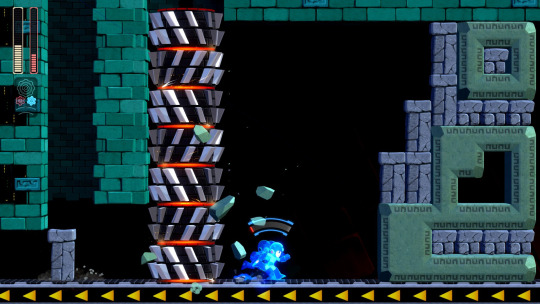
The Mega Man games are quite clever in the way they parse out the platforming and shooting in little bite-sized units. Each screen is essentially an action puzzle for you to solve. It would be so logical for each screen break to be a checkpoint, because each screen break isa checkpoint—the start of the next challenge. Games like Super Meat Boy do this, meting (meating?) out their challenges in bite-sized, infinitely repeatable increments. Nobody accuses Super Meat Boy of being too easy because it doesn’t make you repeat the shit you’ve already completed when you fail at the current task. If you wantthat kind of punishment, no one’s stopping you from resetting the game.
Mega Man 11 adds a “Casual” mode which increases the number of checkpoints, but it’s still annoying to me that the more punishing model is treated as the norm while the more logical distribution of checkpoints is treated as a concession. Soulsplayers will tell me to “git gud,” but that’s why I led with the piano analogy. I got damn good at Malagueña, and I still had time left over to do my homework and play video games.
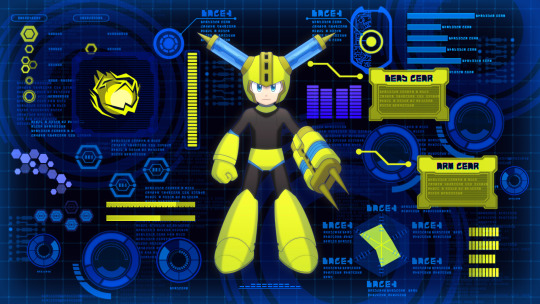
Special Weapons
Using your Special Weapons in Mega Man games is like spending the money you might need to pay rent on stuff you could be getting for free through your well-connected friend Dave. The trial-and-error pairing of the right weapon and the right boss is such an integral part of Mega Man’s progression that any other use of anyspecial weapon becomes a high-risk gamble—unless, of course, you just Google the answers.
I understand the need to impose limits on the more powerful weapons, but games have figured out countless better ways to do this in the thirty-one years since Mega Man 1. Cool-down times. Cool-down meters. Recovery proportional to damage inflicted. Recovery proportional to damage received. Recovery by way of skillful attack, à laMetal Gear Rising. Enemy fire absorption à la Alien Soldier and Radiant Silvergun. Ranger X on the Sega Genesis had solar-powered special weapons; why not steal that idea for this game’s allegedly solar-powered protagonist?

Instead, even in its eleventh installment in two-thousand-goddamn-eighteen, Mega Man still employs an RNG-based item drop system. Replenishing your meter is as simple and menial as finding an enemy spawn point and brainlessly standing and shooting until an enemy happens to drop the energy you need. Don’t forget to cycle over to the gun you want to replenish, or else the battery is wasted, as if Mega Man just eats it by mistake.*
*Later games in the series introduced the Energy Balancer, a purchasable item which automatically refills the weapon that needs refilling even if you don’t have it selected. Why is that a thing you have to buy? Why put a fundamental improvement to the game behind a paywall, virtual or otherwise?
Meanwhile, MM11still employs the same bizarre meter continuity between deaths as past installments. Each death means repeating sections of the stage without reacquiring any previously spent meter, effectively creating a difficulty vortex—the harder this game is, the harder it gets. There was a ruthlessly capitalistic logic to this in the arcade days,but the Mega Man series has never been coin-operated (with a few obscure exceptions). It hasnevermade sense that, often, the best strategy is to voluntarily leap to your death over and over to force a Game Over, just to restart with a full weapon meter as an alternative to the tedium of refilling it manually or facing the boss without it. What is the explanation for this meter continuity in the first place? Are we supposed to think Mega Man is repeatedly exploding and materializing but he can’t materialize a few extra shots from his bubble gun while he’s at it? There’s a multi-faceted idiocy to this whole system.
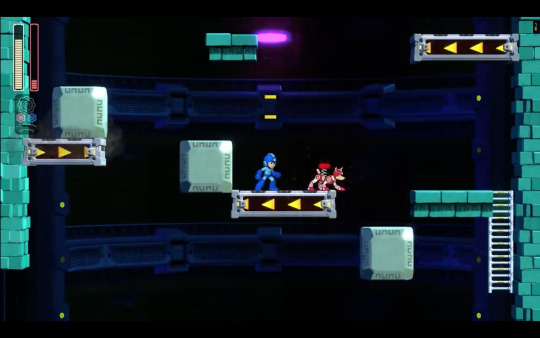
Rush
Capcom ought to take a long, hard look at Rush, Mega Man’s transforming robot dog companion. It’s hard to believe the same guy who invented a fully autonomous solar-powered robot boy couldn’t design a dog-shaped spring that runs on renewable energy. Special weapons are one thing, but why does Rush have an exhaustible meter? He’s a fucking spring. It makes no sense as a narrative detail nor as an element of game design. What exactly are the designers trying to limit? Your ability to spam high jumps? The logistics of the Rush Coil already do that; you have to set him up like a lawn ornament and he peaces out after a single bound. He’s unspammable, even with a full bar. To begin with, there are rarely that many useful opportunities to use the Rush Coil within a single stage, and energy power-ups are infinite as long as you’re willing to endure the chore of finding them, so it’s not as though the game is challenging you to budget your resources—it’s just discouraging you from searching for those meaningful jump opportunities in the first place. It’s driving you to Google.

Bosses
The Robot Masters have always received special star treatment in the Mega Man games but rarely been very interesting as boss fights. You know the deal: dodge the dizzying hail of projectiles in an empty square room while desperately scrambling to land enough hits with the weakness weapon before you die. Considering all the fanfare these bosses get (mug shot, intro screen, and now reveal trailers), most of them feel kind of interchangeable. Most of them have nearly identical silhouettes and shoot functionally redundant projectiles in superficially different shapes. Every gun is a Lucky Charms marshmallow.
The boss fights actually do seem a little more interesting in Mega Man 11—Block Man in particular stands out with his mid-fight transformation into a hulking colossus. I’d hoped to see more of this in future Mega Mans—fights that evolve and really set each Robot Master apart as a distinct embodiment of its corresponding motif—so maybe they’re onto something this time. Still, it’s a little ridiculous that this game has yet another fire boss, electricity boss, cold boss, and bomb boss. Why are we still here?
Before the mob comes for me, I want to stress that there’s always been lots to love about Mega Man, and I’m glad Capcom is investing in the IP again. I just hope this is the start of a long-term effort to reevaluate and improve the series, not another short-sighted extension of a tired status quo.
#mega man 11#mm11#capcom#games#video games#videogames#gaming#reflections#demo#games writing#criticism#rant
21 notes
·
View notes